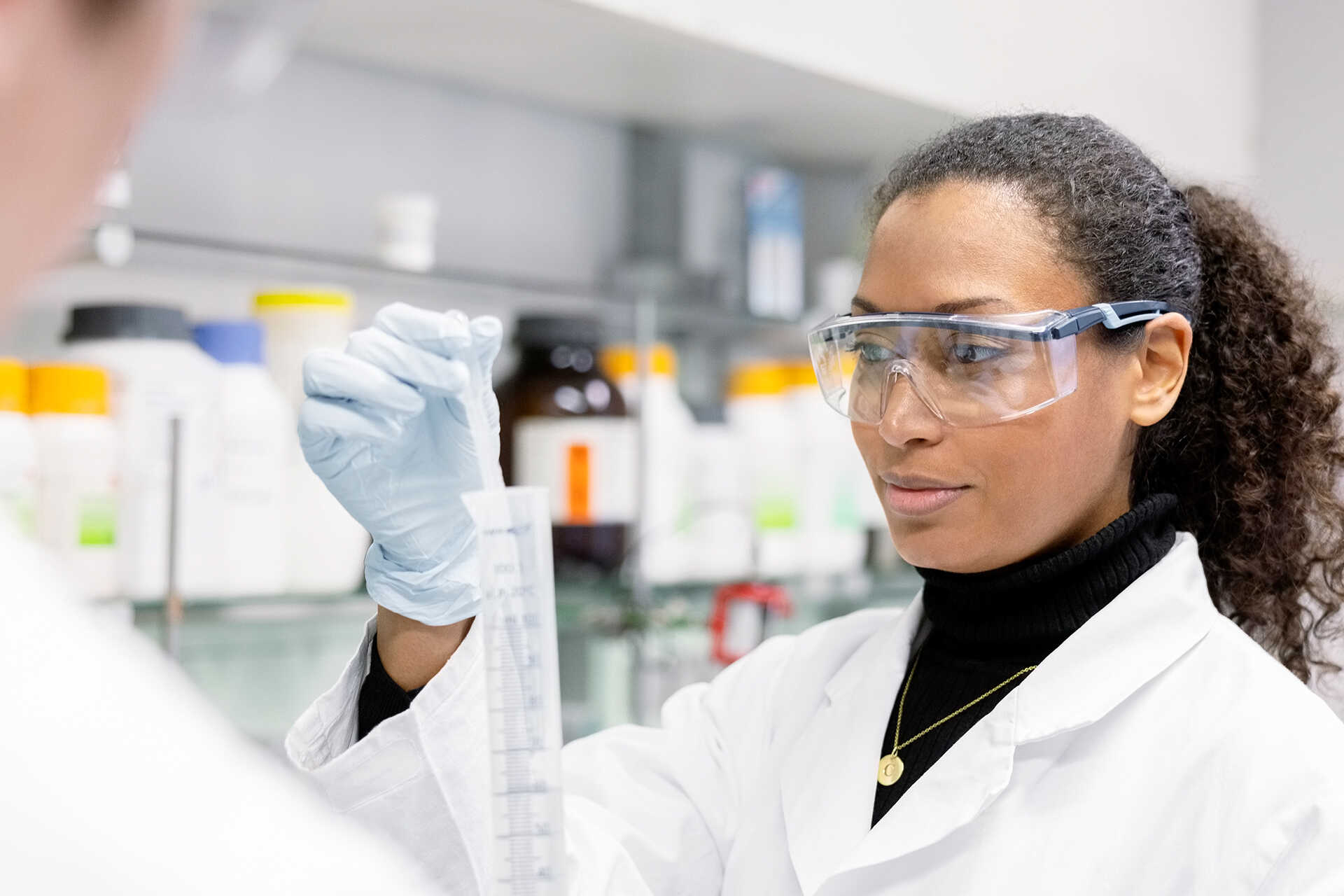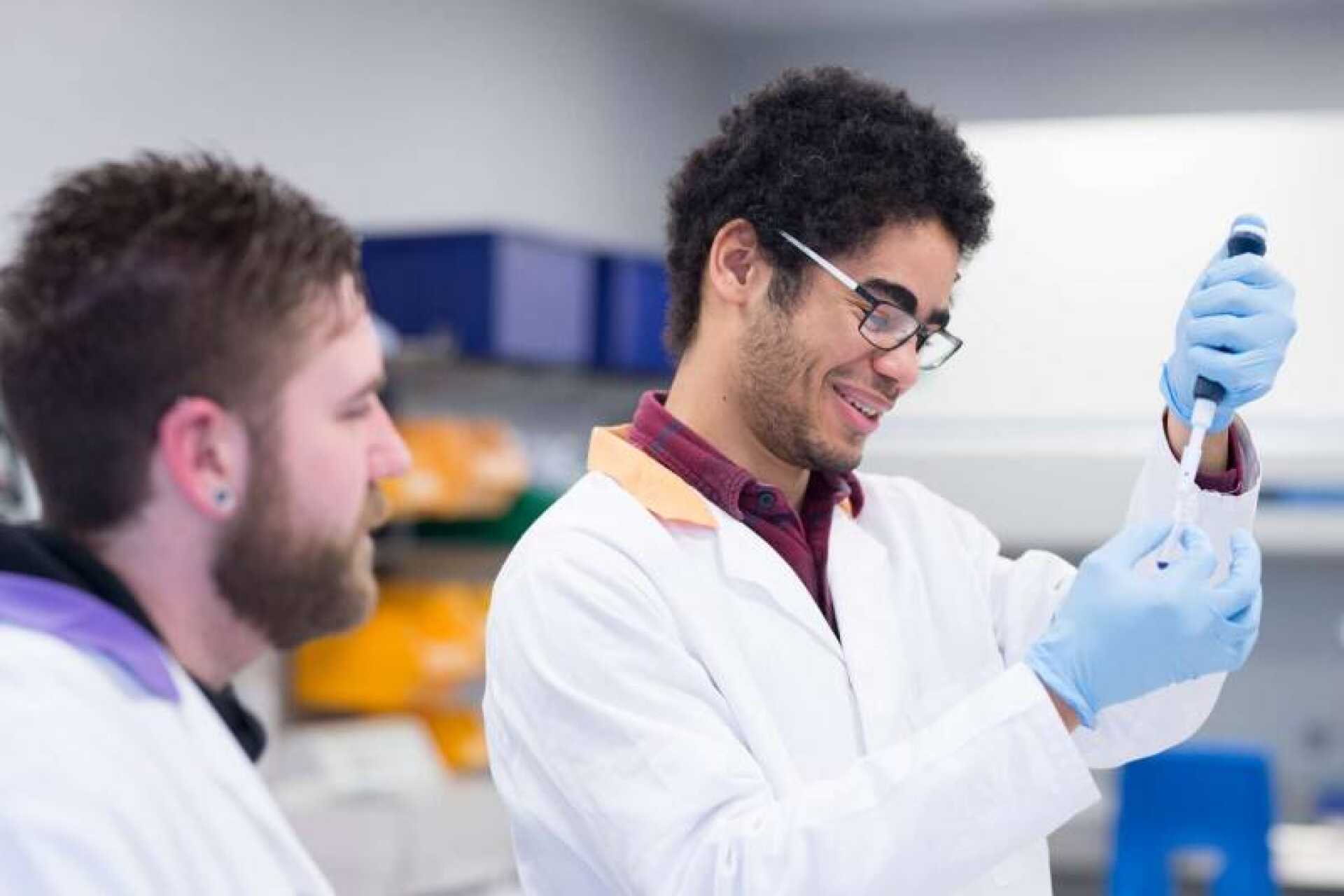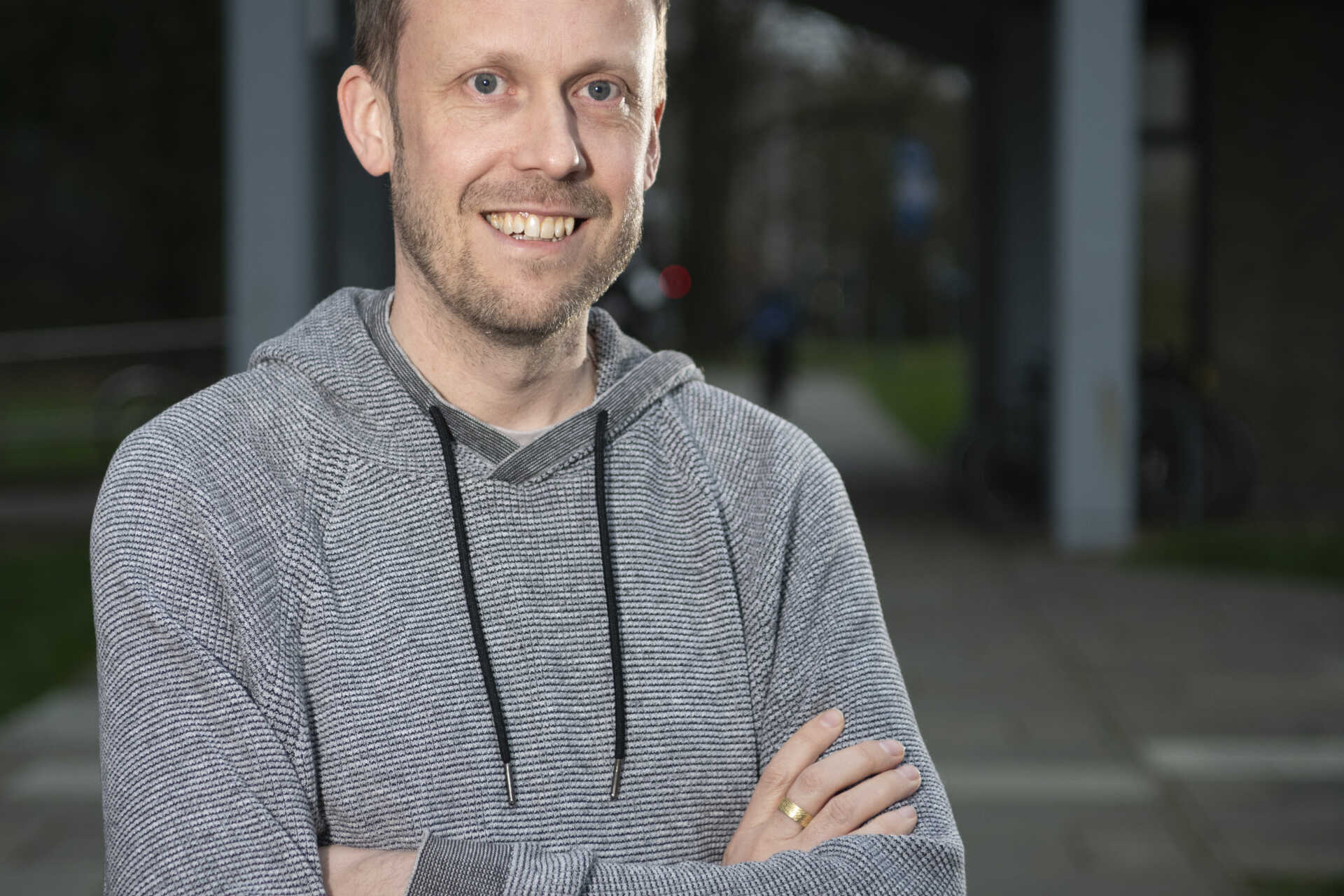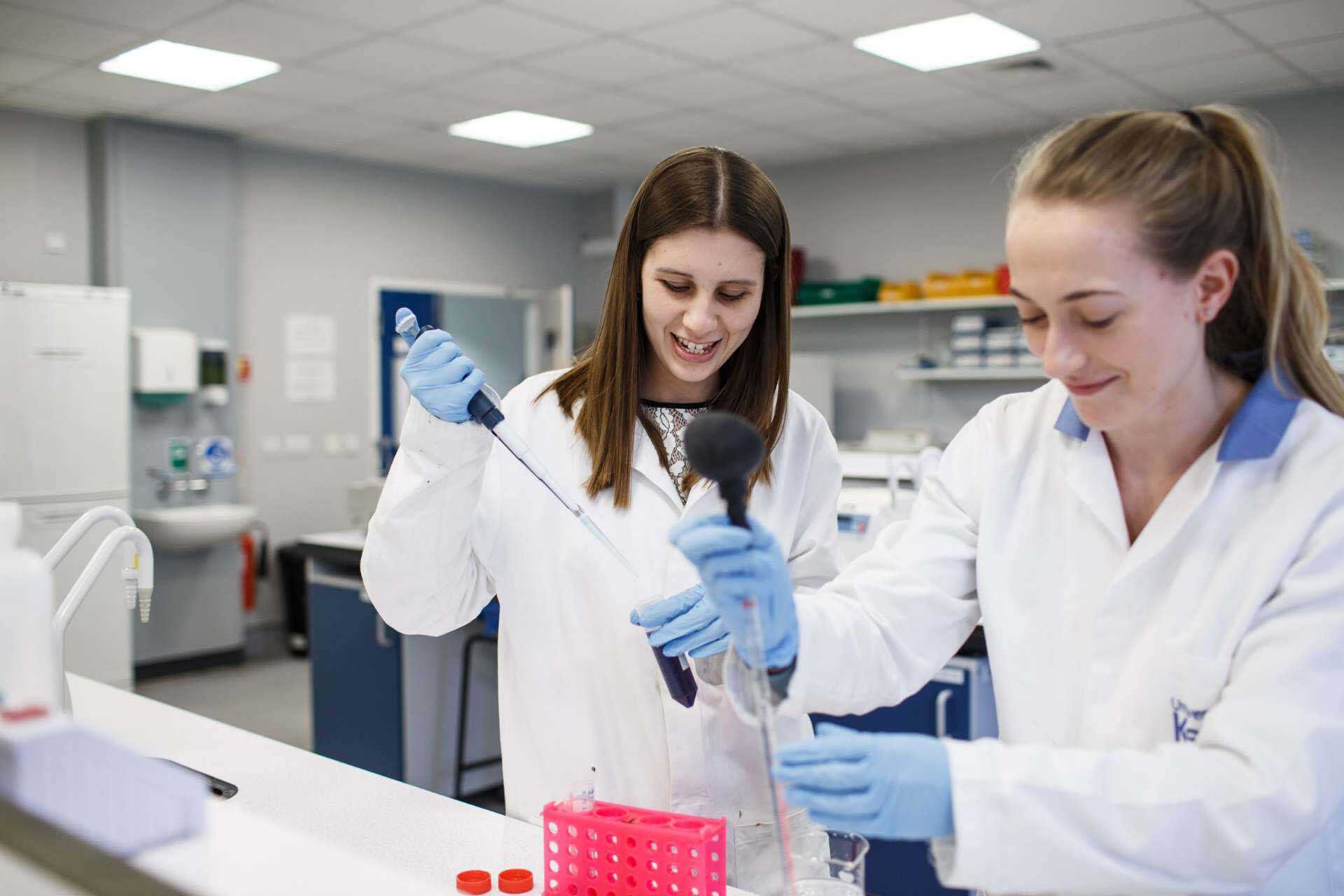Biochemistry
with a Year Abroad
Will you join the next generation of scientists?

Will you join the next generation of scientists?
Tackle contemporary issues in health, agriculture, and the environment. Delve into the intricacies of living organisms at the molecular level, spanning from viruses and bacteria to humans, plants, and other complex organisms. Utilise your expertise and skills to effect meaningful change.
By learning from inspirational academics who are at the forefront of research, you'll acquire practical experience, scientific knowledge, and transferable skills that can help you achieve your academic and professional objectives.
This Biochemistry BSc at Kent is accredited by the Royal Society of Biology (RSB).
Expand your horizons and tailor your degree to suit you with a year abroad, where you'll study at one of our partner institutions for a year. Studying abroad can help you grow in confidence, enhance your employability, plus you'll make friends in the country you're studying in and meet other adventurous students from around the world.

You have the chance to take a paid Summer Studentship after your second year, giving you valuable hands-on experience in our research labs.
Boost your employability with a Biochemistry degree accredited by the Royal Society of Biology.

Professor Ben Goult explains the benefits of studying Biochemistry at Kent.
Regular investment in our laboratories ensures you learn in a world-class environment.

Kent researchers have created a ground-breaking shock-absorbing material to revolutionise defence and planetary science sectors.
Our typical offer levels are listed below and include indicative contextual offers. If you hold alternative qualifications just get in touch and we'll be glad to discuss these with you.
BBB including Biology grade B AND Chemistry grade B or Applied Science Double Award at BB, including the practical endorsement of any science qualifications taken.
The University will consider applicants holding BTEC National Diploma and Extended National Diploma Qualifications (QCF; NQF;OCR) on a case by case basis. Subject likely to be acceptable is Applied Science, Biomedical Science or Medical Science. Typical offers when made are Distinction, Distinction, Merit.
120 tariff points, Typically H5, H6, H6, including Chemistry and Biology 5 at HL |
Mathematics grade C/4
N/A
Merit overall in Science with a minimum of grade B in the core (including grade B in the paper B written examination.
A typical offer would be to obtain Access to HE Diploma with 24 Level 3 credits at Distinction, 18 level 3 credits at Merit and 3 level 3 credits at Pass (assuming syllabus is satisfactory) in Combined Science.
The following modules are what students typically study, but this may change year to year in response to new developments and innovations.
What practical skills are essential for success in the field of biosciences? Through a blend of theoretical knowledge and hands-on experience, you’ll learn to analyse and present biological data using established scientific methods. By purifying your own protein and analysing its function, you’ll gain experience using a wide range of experimental tools, processes and equipment found in modern laboratories.
You’ll discover how to operate safely, professionally and with good laboratory practice. You’ll use digital tools to visualise, analyse and interpret scientific data, and apply mathematical and statistical skills to solve biological problems and make evidence-based conclusions.
By the end of this module, you’ll emerge equipped with the knowledge and skills to undertake scientific experiments confidently, safely and effectively.
Biomolecules are the fundamental building blocks of life on Earth, comprising amino acids, monosaccharides, fatty acids, and the bases of DNA and RNA. These molecules, though basic in structure, form the complex macromolecules—proteins, carbohydrates, lipids, and nucleic acids—that underpin the diversity and adaptability of all life forms.
After exploring the intricate structure/function relationship in these building blocks, you’ll then focus on enzymes, remarkable catalysts that accelerate biochemical reactions. By analysing the kinetics of these enzymes, you will explore how these proteins work and how their activity is controlled, including the mechanisms of enzyme inhibition.
How does your body operate normally, and what happens when health issues arise?
You will explore the anatomy and physiology of healthy tissues, organs, and the major bodily systems. By reviewing and interpreting engaging case studies, you will connect theoretical knowledge with real-life health conditions that impact these systems.
Through these explorations, you will gain a deeper understanding of the causes of these diseases, the important diagnostic techniques we can use to assess them, and how we might treat them.
The principles of chemistry are an essential foundation for a molecular understanding of life. This module will take you through the fundamentals of atoms, elements, functional groups, compounds, chemical bonding and chemical reactions, and examine how these underpin biological systems.
You’ll then explore a range of topics including the molecular basis of thermodynamics and chemical equilibria, molecular forces and interactions, molecular shape and isomerism, the use of spin-resonance spectroscopies, amino acid and protein chemistry, and enzyme catalysis, and their relevance to specific biological topics.
By the end of this module, you’ll understand the importance of chemistry, and you’ll be confident in applying fundamental chemical principles in a biochemical context.
How can you leverage the skills you have acquired so far to thrive throughout your academic journey? This module will allow you to expand your skill set and advance through the scientific process under the guidance of established conventions that define excellence in academia, healthcare, and industry.
You'll apply your practical skills and knowledge to formulate hypotheses, test them effectively, and learn how to analyse and present data for a standard practical laboratory report. By following a series of progressive steps, you'll evolve towards becoming a confident, independent scientist, culminating in a mini-project where you'll integrate all your acquired skills in an extended investigation.
By the end of this module, you’ll have the groundwork in place to support your success in the later stages of your degree, undertaking and reporting on experimental work in line with professional standards in the life sciences sector.
In today's ever-evolving landscape of science and medicine, understanding the complexities of molecular and cellular biology within the context of evolution and the genetics of human disease is essential.
You’ll explore cell structure and organisation, the intricacies of cell membranes, molecular trafficking, and the orchestration of organelles vital for energy production and metabolism. In addition, you’ll navigate cells' internal skeleton, chromosome dynamics, and the fascinating processes of cell division and meiosis. You’ll also study DNA replication, repair, and recombination, uncovering the secrets of chromatin structure and mutation.
Further topics include the intricate pathways of transcription, mRNA processing, and protein production. You’ll also have a chance to immerse yourself in the world of genetics, from Mendelian inheritance to the complexities of human pedigrees and quantitative genetics. Finally, you’ll explore the mechanisms underpinning evolution and gain insight into the transformative power of molecular analysis in diagnosing human diseases.

There's not one module I don't enjoy – they're all very interesting.Vivian Moreno, Biomedical Science with a Sandwich Year BSc
How do genes work and how can we manipulate them? How can techniques such as whole-genome sequencing and genome editing detect and treat diseases? This module deals with the flow of genetic information from DNA to RNA to protein in organisms, ranging from viruses to humans.
You’ll learn how genetic information is stored in DNA and RNA, how that information is decoded by the cell, and how the flow of information is controlled in response to changes in the environment or developmental stage. You’ll compare and contrast mechanisms of gene regulation in prokaryotes and eukaryotes, and explore the latest developments in molecular genetic techniques to analyse and manipulate gene function. You’ll also explore how these mechanisms can be applied to research on human disease and the biomanufacturing of useful biological products with real-world applications.
Whether it is biology, biochemistry or biomedical sciences, scientists need to understand their subject matter. But additional skills are also needed to successfully work as a scientist. These relate to scientific ways of answering questions and the generation of subject-specific knowledge.
In this module, you’ll interpret scientific data generated with experimental methods that are commonly used in the biological sciences. You’ll develop your understanding of how to generate new scientific knowledge based on such data and apply these skills to create scientific studies that use combinations of methods to answer scientific questions.
Finally, you’ll apply the skills you gain in this module to design a standard operating procedure as is commonly required by clinical and industrial employers of graduates.
The cell is the fundamental structural unit in living organisms. Eukaryotic cells are compartmentalised structures and, like prokaryotic cells, they must perform several vital functions such as energy production, cell division and DNA replication, and modulate these functions in response to extracellular environmental cues.
This module explores the experimental approaches that have been taken to investigate cell biology and the similarities and differences between cells of complex multicellular organisms and microbial cells. Initially, you will study the functions of the cytoskeleton and the nucleus, followed by cell signaling, protein synthesis, and how these processes are precisely integrated to specific cellular compartments. Through exploring these topics, you will develop a deeper understanding of the molecular details underlying cell organisation and function and be able to use this to address fundamental questions in biotechnology and medicine.
Metabolism defines the biology of a species. Metabolic pathways – the biochemical reactions that take place in cells – provide a molecular framework that dictates the physiology, ecology and pathogenicity of living organisms.
Through the analysis of metabolic processes in humans, plants and microorganisms, you’ll develop a detailed understanding of the machinery that enables the essential processes required for life, as well as of the more exotic adaptations that enable the colonisation of diverse environmental niches.
Furthermore, by exploring pathway mechanisms and their regulation, you’ll gain key insights into the importance of metabolic processes in health and disease, agriculture and biotechnology.
Microorganisms are all around us and form an integral part of us. Without them, we could not exist. You will explore the diversity, function and utility of microorganisms around planet Earth – and beyond. From their role in shaping the environment to their deployment in biotechnology, the microbial world is increasingly coming under the spotlight for its place in our ecosystem and the properties that allow it to operate in different contexts.
You’ll study the origin of microorganisms and the methods — classical and modern — used in their classification, cultivation and manipulation. Modern molecular tools offer significant benefits to microbiology, and you will learn about their background and the rationale for their use.
At the end of this module, you will have developed new insights into the essential role that microorganisms play in the world and the potential for harnessing and controlling them.
Have you ever wondered how your immune system knows what to respond to? What is the anatomy of the immune system and how does it function? Why does an impaired immune system lead to disease? You’ll explore some of these questions and dive into the world of innate and adaptive immunity, developing an understanding of how the body responds to injury or infection.
You’ll examine immunopathology which involves conditions where the immune system attacks the body, such as autoimmune diseases, allergies, and responses to tumours or transplants. Finally, you’ll apply your understanding of the immune system to understand how current immunology-based technologies and treatments—such as monoclonal antibodies— combat diseases.
By the end of this module, you'll have a solid grasp of how our immune system works and why it’s so important in maintaining our health as well as the understanding of how to apply this knowledge into treatments and solutions.
The human brain is the most complex living structure in the universe and has enabled humans to achieve breath-taking milestones such as walking on the moon, mapping the human genome, and composing masterpieces of literature, art, and music. But how does the human brain work?
You will learn about the biology of the mind, and the molecules underpinning these processes, to develop an understanding of how we experience emotions and initiate behaviours. You will consider the technological advances that have opened new horizons for the scientific study of the brain, and finally, you will apply your learning to the emerging science on brain disorders with wide societal impact, such as depression and addiction.
Going abroad as part of your degree is an amazing experience and a chance to develop personally, academically and professionally. You experience a different culture, gain a new academic perspective, establish international contacts and enhance your employability.
Between Stages 2 and 3, you spend a year at one of our partner universities in North America, Mainland Europe or South East Asia. For a full list, please see Go Abroad. Places are subject to availability, language and degree programme.
Progression:
To progress to stage 2 you must achieve an overall average of 65% in Stage 1 unless you applied before July and met the conditions of the entry offer made.
Student entrants who are offered a Year Abroad placement on the basis of Stage 1 grades must maintain their academic performance through Stage 2 (achieving an overall Stage 2 average of 60%) to be permitted to take up the offer.
If these requirements are not met, you will be transferred to the equivalent 3-year programme which is identical except for the year spent away from the University.
Where could you go in a year?
My ‘You only live once’ decision to study in Japan is one of the best I’ve ever made. I had a fantastic year.Cheyenne Nolan Find out more
Have you got a burning question in biosciences you would like to answer? Do you want to hone your lab skills for a career in academia or industry? Do you see yourself as a bio-based entrepreneur, or is your passion for communicating biosciences to different audiences? In this module, you will work directly towards these ambitions by gaining experience in your chosen subject area.
Working closely with your academic supervisor, you’ll select either a lab-based or data-driven project in which you will answer scientific questions that interest you. These could potentially contribute to new discoveries and expand the frontiers of our current knowledge and understanding.
In a business project, you’ll develop your ideas into a business plan. In a communications project, you’ll create educational tools for either the general public, specific professional audiences, or school children. Whatever future career you have in mind, this module will provide you with essential skills to help you achieve your goals.
Proteins are one of the most important biomolecules made by cells. They carry out a myriad of functions, from catalysis of reactions essential for life to structural scaffolds controlling cell shape and movement. Proteins are the tools encoded in DNA to create a living system and are fascinating molecules to study.
You’ll explore the structural organisation of proteins and how they fold into unique conformations that determine their functional properties. You’ll study catalysis, ligand binding and how proteins come together to create molecular machines. You will also investigate the techniques we use to study proteins. These methods have developed rapidly over the last 20 years, and continue to do so.
You’ll have access to advanced instrumentation and be able to work with real data sets. This will enable you to develop problem-solving skills and gain detailed knowledge of this important area of biochemistry.
What are viruses and what can we do to protect ourselves? The COVID-19 pandemic has brought viruses into the focus of wider public attention. By analysing scientific research articles in an interactive, collaborative and student-led approach, you will establish an in-depth understanding of these unique pathogens that are not even living organisms.
You will discover how the evolution of viruses is driven by a continuous tug-of-war with the immune system. This will enable you to appreciate the successes that we have made in protecting ourselves from virus diseases but also highlight open questions and areas of future research. This knowledge and understanding brings you to the frontier of developments in the field, where you can help drive forward progress and make a real difference.
What is cancer and why is it so difficult to cure? Cancer is a disease that almost everybody is affected by during their lives, directly and/or indirectly. You will gain a comprehensive understanding of the disease, including what defines a cancer cell, and the mechanisms underlying cancer cell formation and behaviour.
This will enable you to understand why cancer is particularly difficult to treat successfully, why cancer therapies are associated with significant adverse effects, and how cancer treatments have nevertheless dramatically improved over time and continue to do so. This knowledge will enable you to become an expert in cancer, who is up-to-date on this important disease and equipped to follow, understand and drive future developments and progress in the field.
We live in an exciting time where we can easily sequence entire genomes. This, coupled with advances in Artificial Intelligence (AI), has driven significant development in bioinformatics methods - the tools we use to study the sequence information. You will explore state-of-the-art bioinformatics and genomics tools, with a strong focus on practical application of these tools to answer important biological questions. You will combine information from multiple tools to gain detailed knowledge and understanding in the interpretation of results from bioinformatics and genomics resources, particularly in understanding how genetic variants are associated with disease. The skills and experience you gain from applying knowledge through genomics tool gives you everything you need to kickstart your career in genomics.
Biology of Ageing delves into the intricate molecular mechanisms underlying the ageing process. You will explore the genetic factors, cellular changes, and physiology that influence lifespan and age-related health, as well as how these are influenced by lifestyle such as diet.
Through this, you will be equipped with a wealth of knowledge that you can use to understand the plethora of scientific and general news articles on the topic of ageing and use these to inform your own opinions. In addition to developing an overview of ageing biology, you will investigate the techniques, systems, and models that have been used to advance the field and learn to analyse real-life data generated by researchers in this field. Overall, you’ll understand the benefits and challenges underlying recent advances in age-related healthcare and the ethical, economic and societal benefits of these. This understanding will help you in making new discoveries in the field.
How do new scientific breakthroughs become embedded positively within society? How do we build trust and confidence in science and technology, so that the public are empowered to make the best decisions for themselves and those around them? How do we sustain a strong future for science by inspiring the next generation? Consider key principles in science communication, reflect on specific historic and contemporary case studies, and develop a personal and professional understanding of your social roles and responsibilities as a scientist.
You will explore ways in which scientist construct key messages in the context of professional disciplines such as media, policy makers, private sector and charitable organisations, and understand the role that scientists play outside of the immediate scientific environment. Finally, you will apply best practice in science communication and public engagement to global challenges for which science and technology provides potential solutions.
Teaching includes lectures, laboratory classes, workshops, problem-solving sessions and tutorials. You have an Academic Adviser who you meet with at regular intervals to discuss your progress, and most importantly, to identify ways in which you can improve your work further so that you reach your full potential.
Most modules are assessed by a combination of continuous assessment and end-of-year exams. Exams take place at the end of the academic year and count for 50% or more of the module mark. Stage 1 assessments do not contribute to the final degree classification, but all Stage 2 and 3 assessments do, meaning that your final degree award is an average of many different components. On average, 29% of your time is spent in an activity led by an academic; the rest of your time is for independent study.
For a student studying full time, each academic year of the programme will comprise 1200 learning hours which include both direct contact hours and private study hours. The precise breakdown of hours will be subject dependent and will vary according to modules.
Methods of assessment will vary according to subject specialism and individual modules.
Please refer to the individual module details under Course Structure.
For course aims and learning outcomes please see the course specification.
Graduate with an excellent grounding in scientific knowledge and extensive laboratory experience. During your studies, you’ll also develop key transferable skills in research, critical thinking, analytical abilities and problem solving.
Our dedicated Careers and Employability team are here to support you with a range of workshops to develop your skills and confidence at every stage of your degree. Plus there’s advice and support to prepare you for placements and life after you graduate from Kent.

*The Government announced on 4 November 2024 that tuition fees in England for Home students will increase to £9,535 from £9,250 for the academic year 2025/26. This increase requires Parliamentary approval, which is expected to be given in early/mid 2025.
Tuition fees may be increased in the second and subsequent years of your course. Detailed information on possible future increases in tuition fees is contained in the Tuition Fees Increase Policy.
The University will assess your fee status as part of the application process. If you are uncertain about your fee status you may wish to seek advice from UKCISA before applying.
For details of when and how to pay fees and charges, please see our Student Finance Guide.
Fees for undergraduate students are £1,900.
Fees for undergraduate students are £1,430.
Students studying abroad for less than one academic year will pay full fees according to their fee status.
Students will require regular access to a desktop computer/laptop with an internet connection to use the University of Kent’s online resources and systems. Please see information about the minimum computer requirements for study.
There will be additional costs associated with the Year Abroad such as travel, accommodation, health and food costs. Please see Kent’s Go Abroad webpages on Costs and Funding for more information.
Find out more about accommodation and living costs, plus general additional costs that you may pay when studying at Kent.
Kent offers generous financial support schemes to assist eligible undergraduate students during their studies. See our funding page for more details.

We have a range of subject-specific awards and scholarships for academic, sporting and musical achievement.
We welcome applications from students all around the world with a wide range of international qualifications.

Student Life

Powered by progress
Kent has climbed 12 places to reach the top 40 in The Times Good University Guide 2025.
Kent Sport
Kent has risen 11 places in THE’s REF 2021 ranking, confirming us as a leading research university.

An unmissable part of your student experience.